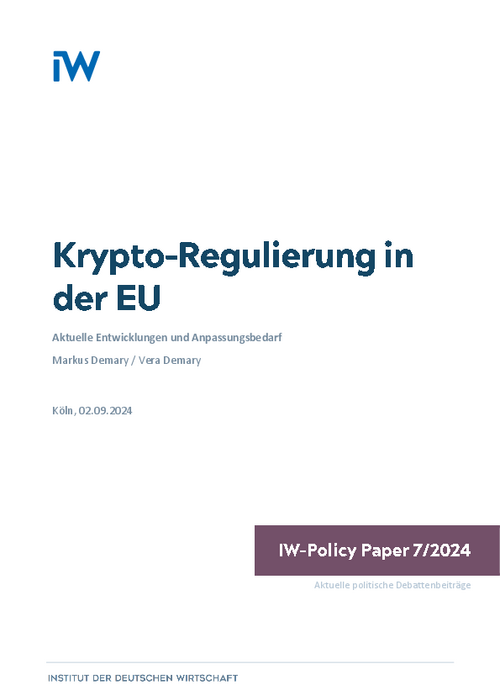FC Bayern Munich footballers advertise for the crypto exchange Bitpanda, Crypto.com advertised with rapper Eminem during the NBA playoffs of the Los Angeles Lakers basketball team, whose arena was renamed “Crypto.com Arena” in 2021.

Crypto regulation in the EU

FC Bayern Munich footballers advertise for the crypto exchange Bitpanda, Crypto.com advertised with rapper Eminem during the NBA playoffs of the Los Angeles Lakers basketball team, whose arena was renamed “Crypto.com Arena” in 2021.
The crypto community is becoming increasingly professionalized. The focus is mostly on young people: in Germany, there are 1.8 million crypto holders in the under-35 age group compared to 300,000 bond holders and 2.8 million share holders in this age group. Due to the popularity of crypto assets among young people, this policy paper therefore examines the extent to which the EU protects crypto investors and where challenges still exist.
At European level, the Markets for Crypto Assets Regulation (MiCAR) in particular plays a role in the regulation of crypto assets, which covers crypto trading platforms based in the EU, for example, but also other crypto services and sets clear requirements for these in terms of investor protection. Other regulations apply to financial products based on crypto assets, depending on their structure. The prevention of money laundering and taxation of crypto assets are now also the focus of the EU and are largely regulated. Another phenomenon is also relevant, namely the advertising of crypto investments via influencers. In 2023, around 10% of adults up to the age of 64 will have obtained information on financial topics via influencers, meaning that the regulation of influencers, which is not regulated centrally at EU level but in many individual regulations, is also relevant to the analysis.
Overall, it can be seen that much progress has recently been made in the regulation of crypto-assets. The definition of crypto-assets, the closing of regulatory loopholes and the improvement of investor protection with regard to claims for damages as well as improvements in the fight against tax evasion, money laundering and terrorist financing are positive. However, there is still potential for improving investor protection in the marketing of crypto assets. In general, however, it is conceivable that this will not necessarily be achieved through new regulation, but through increased and improved education. Specifically, the following steps would make sense:
- Improve financial education in schools. As this has so far focused in many cases on interest calculations, i.e. savings accounts, and has so far not covered share, bond and crypto investments.
- Further increase the transparency of influencer regulation. With the Influencer Legal Hub, there is already an information point that makes the existing regulations transparent and easily accessible for the target group. This must be continued, and further regulations integrated.
- Improve enforcement of existing European regulation. Compliance with existing regulation can also be increased by better enforcement, for example through high-profile, regular sweeps.
- More resources for researching illegal money and fraud schemes in the digital space. New technologies create new opportunities for criminals. Law enforcement must be able to keep pace with these developments in terms of technology and organization.
- Algorithmic trading and high-frequency trading should be subject to comparable regulation for crypto-assets and traditional financial instruments. To this end, the supervisory authorities should closely monitor the use of algorithms and automated trading on the crypto markets and initiate the necessary regulatory initiatives at an early stage.

Crypto regulation in the EU

More on the topic

The EU and money: Who pays, who gets?
The German net position fell slightly in 2023 compared to the previous year, from 19.7 billion euros to 17.4 billion euros. However, it is still significantly higher than in the pre-Brexit period.
IW
Trump or Harris or ...? What Europe must prepare for
A few months before the presidential election in the USA, Donald Trump has a good chance of being re-elected. On the Democratic side, the incumbent president has withdrawn his candidacy after a long period of hesitation, while Vice President Kamala Harris is ...
IW